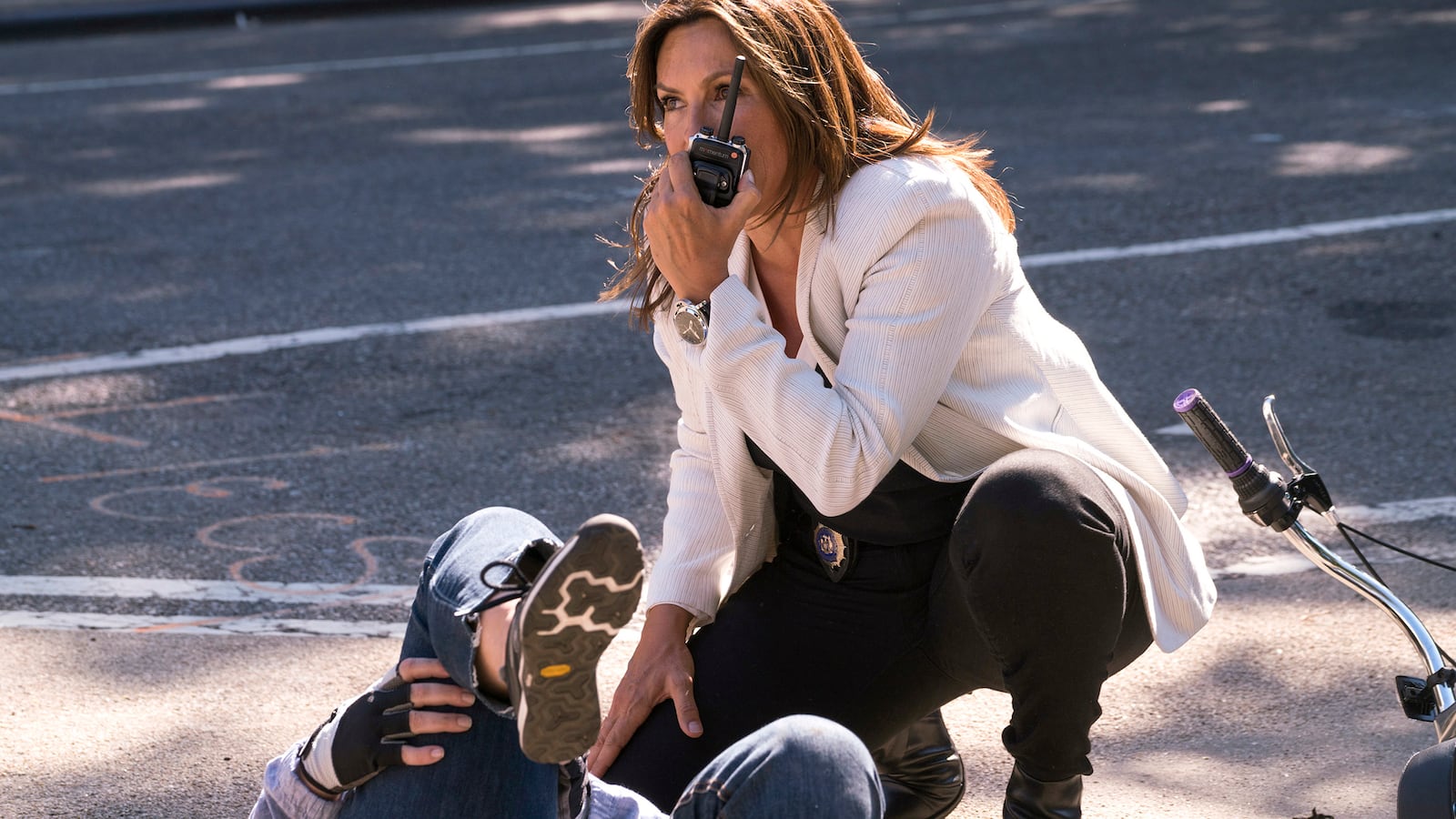Law & Order: SVU, Dick Wolf’s epic crime procedural, has gained notoriety in the past few years for its ripped-from-the-headlines plots. With storylines based off famous kidnapping cases like Natalee Holloway’s, or hot-button political issues (among others, a recent episode from season 19 featured an Ann Coulter-esque character embroiled in alt-right campus protests), SVU recognizes that real life is often excellent fodder for the show. Season 19’s finale even danced around issues of immigration and the effects of DACA without coming to an explicit conclusion.
So it’s no surprise that in “Man Up/Man Down,” the show’s 20th season premiere, SVU turns its focus to another real-life issue: gun violence, and more specifically, school shootings. Because it’s SVU, the discussion surrounding gun violence also includes an exploration of the effects of toxic masculinity, and a subplot involving a pregnant detective and her indecision about an abortion (spoiler: it’s not Olivia Benson).
The two-hour premiere begins like any other SVU episode: with a frantic foot chase through the park as Lieutenant Olivia Benson (Mariska Hargitay) pursues a fleeing suspect, along with Detectives Fin Tutuola (the always enjoyable Ice-T) and Sonny Carisi (Peter Scanavino). In the midst of her chase, Benson gets winded, and watches helplessly as the suspect outruns her—though he’s soon apprehended by Carisi. Benson, obviously shaken by her moment of weakness, attempts to put on a brave face.
From there, the show launches into the heartbreaking case of a young boy named Sam who was sexually assaulted while on a hunting trip with his family. After a few false starts, the detectives eventually determine that Sam’s rape was a testosterone-fueled, sadistic attempt by his father to “make him a man” after Sam failed to shoot a rabbit while hunting. His father’s ferocious grasp of masculinity apparently extends to anally raping his son, but after a tense trial, Sam’s father is acquitted.
Meanwhile, Benson grapples with her waning physical abilities and identity as a mother. “You know, Fin, I’m a mom and a cop. That’s who I am,” she says to Det. Tutuola, after revealing she got winded during a chase. The concept of motherhood—especially as it relates to Benson, Detective Amanda Rollins (Kelli Giddish), and the agonized guilt of Sam’s mother—forms a quiet contrast to the macho men dominating the episode’s narrative. Rollins, newly pregnant, agonizes over a decision to abort or not. “All I know is that if I was back home, the choice would be a lot easier,” she tells Benson shortly after revealing her pregnancy. “There’d be no choice.” Benson, ever supportive, counsels Rollins to follow her heart—but implies that she had an abortion and regretted it.
It’s all pretty quintessential SVU up until this point—the toxic masculinity, the especially heinous crime that ensues as a result, the courtroom theatrics—until the tenor of the episode abruptly changes after the trial. Gone are the wisecracks from Ice-T and feel-good platitudes offered by the detectives to sexual-assault victims. Instead, a distraught and obviously traumatized Sam returns to school with his brother, only to begin shooting his classmates with his father’s hunting rifle.
The episode, mercifully, doesn’t show the shooting in the episode. Rather, an eerily unemotional Sam walks through the front doors, and turns his duffel back horizontally, in a clear indicator of the violence to come. The next scene shows paramedics, dead bodies, frightened, crying students and faculty, and police in riot gear—a scene that’s become all too familiar to us in the real-life news cycle.
A broken-down Sam reveals to Carisi and ADA Peter Stone (Philip Winchester) that he shot his classmates to prove his “manliness” to his father, who is charged with criminally-negligent homicide as a result. His father is found guilty, and the episode ends on a would-be high note: justice is served, and we can all breathe a sigh of relief.

Or are things really that simple? Midway through the episode, soon after the shooting, ADA Stone quietly observes, “What’s happening in this country is never going to end, is it?” It’s a relatively insignificant line, said in a moment of candor to Lt. Benson, and yet it so succinctly summarizes the frustration that many Americans feel in the light of massacres like Parkland, Newtown, Aurora, and the countless other tragic instances of gun violence that could be so easily prevented. Stone’s line gives voice to our collective frustration—while indirectly suggesting that maybe it’s about time we do something.
The episode seems to suggest that it’s not only guns and gun control that are to blame for school shootings, it’s also the value still placed on traditional masculine ideals. Sam’s father rapes him to teach him how to be a man; and Sam, in turn, manifests this dangerously warped idea of masculinity by shooting his classmates.
It’s a bit outrageous, for sure, but the episode’s arc offers a valid critique of how the “boys being boys” mindset can more often than not lead to unimaginable moments of violence. Toxic masculinity denotes a certain level of entitlement and selfishness, culminating in an utter lack of respect for human life. Whether that inherent disrespect for others leads to sexual violence, as is often the case, or to a murder spree, well, it’s all just part of “being a man.”
SVU is not, and has never been, an overtly political show. While plotlines can hint at larger political issues, the show never really makes a statement one way or the other. “Man Up/Man Down” is not very different in this regard—it’s Sam’s abusive, commandeering father who’s portrayed as the villain here, not the Second Amendment, the gun Sam used to murder his classmates, or even Sam himself. But by introducing a conversation about masculinity and gun control in its very first episode of the season, SVU seems to be suggesting that if, for some reason we haven’t been having these discussions before, it’s about time for us to start.





